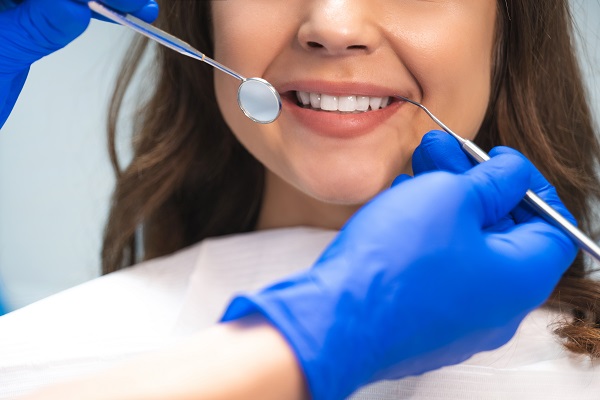A dental cleaning is a preventative treatment that can protect teeth against tooth decay and gum disease. The treatment is performed to remove plaque and tartar from teeth surfaces. Plaque is a sticky film that coats teeth surfaces. It is made up of bacteria, acids and food particles, and it eats away at teeth surfaces. Plaque also calcifies when left on teeth for extended periods, turning into tartar.
Tartar cannot be removed by brushing, and it facilitates tooth decay. The only way to get these deposits that serve as free housing for oral bacteria off your teeth is to have a dentist scrape them off with a scaler.
Professional teeth cleaning should be part of everyone's oral hygiene routine. Dentists recommend getting the treatment at least two times a year. This reduces the odds of gum disease developing or progressing. It also improves the appearance of the person's teeth since tartar gives teeth a yellow tint.
What to expect when getting a dental cleaning
Getting your teeth cleaned by a dentist starts with a consultation. During the appointment, the dentist will examine the patient's teeth looking for signs of developing issues. X-rays may be taken to evaluate teeth roots and gum pockets.
The dentist will then use an instrument called a scaler and a dental mirror to remove tartar and plaque from teeth surfaces. Ultrasonic instruments can also be used to clean teeth. It is a painless procedure, so local anesthetics are typically not used.
When the dentist is done removing tartar and plaque deposits from the patient's teeth, they will use dental floss to clean interdental spaces. The dentist might finish up the treatment by performing a fluoride treatment to remineralize the patient's teeth and protect them against tooth decay.
Most patients who get teeth cleaning do not feel uncomfortable while the dentist works. In the rare event a patient experiences pain during the treatment, the dentist can use other tools to improve the patient's experience.
Dental cleanings typically take anywhere from 30 to 60 minutes. The patient spends the entire time laying back in a dental chair. By the time the treatment is over, the patient's teeth should be free of tartar, which improves their aesthetics. Professional teeth whitening goes a long way when it comes to keeping teeth free of tartar and the issues that it can cause. It also allows for the early detection of developing oral issues, which typically leads to less invasive treatments and lower dental bills.
The benefits of getting regular teeth cleanings include:
- Protection against gum disease and tooth decay
- Early detection of oral issues
- Fresher breath for the patient
- Improved appearance of teeth
- Improved overall health
- Fewer teeth stains
Get your teeth cleaned
Regular dental cleanings should be part of your oral hygiene routine. Call or visit our Ijamsville clinic to learn more about how our dentist can protect your oral and overall health with a professional teeth cleaning.
Request an appointment here: https://urbanafamily.com or call Urbana Family Dental Care at (301) 605-1157 for an appointment in our Ijamsville office.
Check out what others are saying about our dental services on Yelp: Dental Cleaning in Ijamsville, MD.
Related Posts
What a Dental Exam Entails
Undergoing a dental exam at least twice a year is important for patients of all ages. A lot of oral health problems go unnoticed because they are symptomless or the signs are so minuscule that …
Dental Exam for Children
The right time for children to visit a kid friendly dentist may be sooner than you think. In fact, the Academy of Pediatric Dentistry (AAPD) recommends that children should go to the dentist by the …
3 Questions To Ask Your Dentist During Oral Exams
The American Dental Association recommends that people visit their dentist twice yearly for oral exams, cleaning, and x-rays. The dental visits offer patients a chance to ask questions about their oral health or any concerns …
Important Preventive Dentistry Visits
Preventive dentistry is important in maintaining oral health. Visits in this field of dentistry involve treatment and dental education. These appointments aim to prevent gum disease, cavities, and enamel wear. They …

